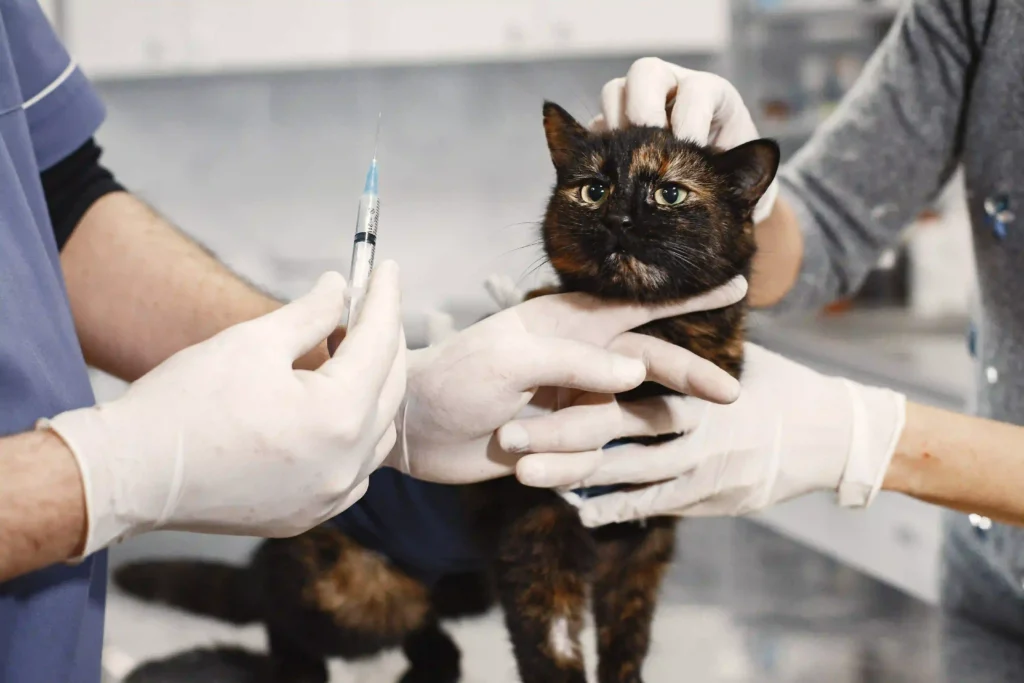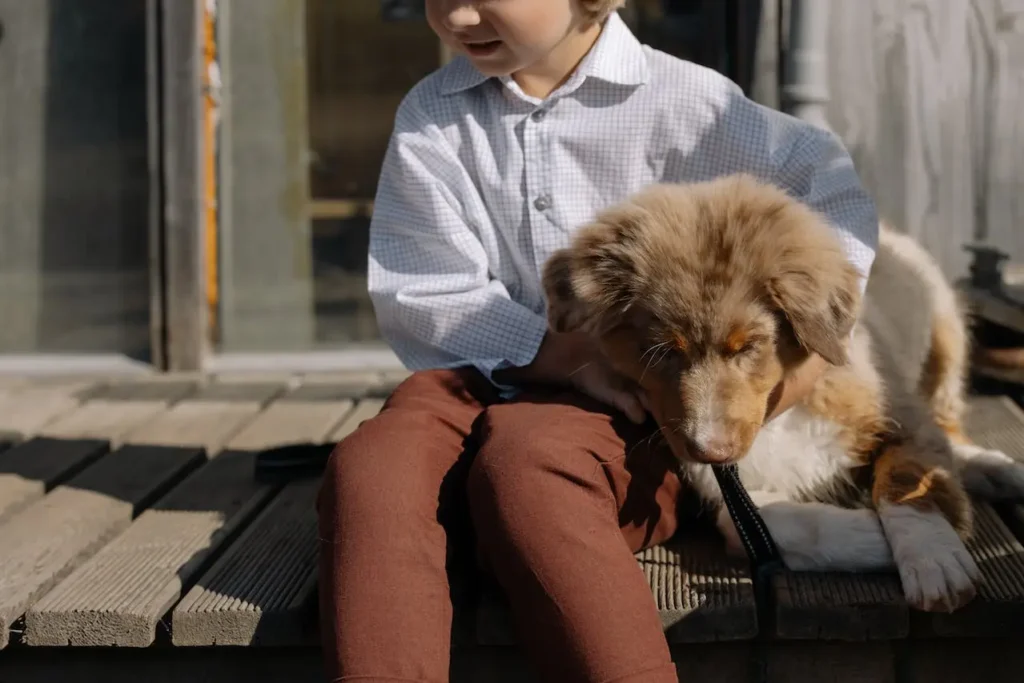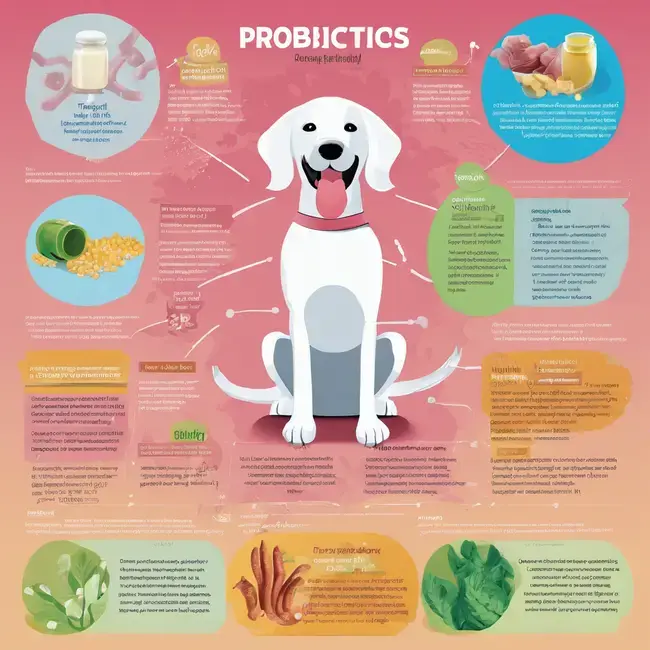Can Dogs Eat Cauliflower? Discover 10 Key Benefits and Risks
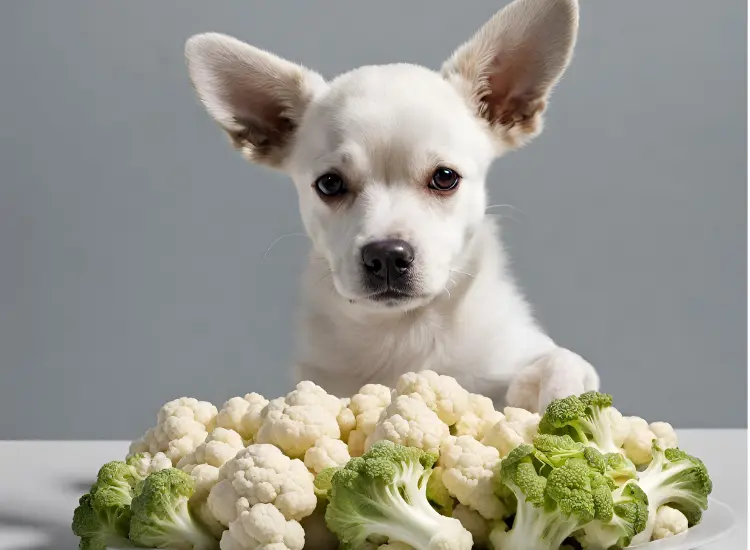
- Can dogs eat cauliflower?
- Is cauliflower good for dogs?
- Nutritional value of cauliflower for dogs
- Key benefits of cauliflower for dogs
- Potential risks associated with cauliflower for dogs
- Precautions when feeding cauliflower to dogs
- How much cauliflower can a dog eat?
- Can dogs eat raw cauliflower?
- Can dogs eat cooked cauliflower?
- Can dogs eat cauliflower leaves and stems?
- Can dogs eat cauliflower crust?
- Can dogs eat cauliflower rice?
- Can dogs eat broccoli and cauliflower?
- Other foods and fruits safe for dogs to eat
- Conclusion
- Frequently Asked Questions (FAQs)
- Resources
This post may contain affiliate links, meaning I may earn a commission if you make a purchase, at no extra cost to you. I only recommend products I trust. Thank you for your support.
Cauliflower is a nutritious vegetable many humans enjoy, but can dogs eat cauliflower too? This article will explore the health benefits, precautions, and risks of cauliflower for dogs.
While cauliflower can be a healthy addition to a dog’s diet, it is important to consider certain factors before incorporating it into their meals.
Can dogs eat cauliflower?
Yes, dogs can eat cauliflower and it can be a healthy addition to their diet when served in moderation.
Cauliflower is a good source of fiber, vitamins K, C, and B6, folate, and minerals such as potassium and manganese, which support various aspects of a dog’s health, including vision, immune system, and muscle health.
Is cauliflower good for dogs?
Yes, cauliflower is indeed good for dogs when given in moderation. It is a low-calorie vegetable that is packed with vitamins and minerals.
Cauliflower is a great source of fiber, which can aid in digestion and promote a healthy weight. It also contains antioxidants that can boost the immune system and help fight against diseases.
While cauliflower is safe for dogs, excessive consumption can lead to gas and digestive discomfort, especially due to its high fiber content.
Nutritional value of cauliflower for dogs
Cauliflower is a nutrient dense vegetable that can provide several key vitamins and minerals to dogs.
Here is the nutritional value of cauliflower for dogs:
- Vitamins: Vitamin C, Vitamin K, Vitamin B6, Folate
- Minerals: Potassium, Manganese, Magnesium, Phosphorus, Sulforaphane
- Fiber
- Low in Calories
- Antioxidants: Beta-carotene, Quercetin
- Low in Fat
- Choline
Key benefits of cauliflower for dogs
Feeding cauliflower to dogs can provide several health benefits.
Here are 10 key benefits of cauliflower for dogs:
1. Rich in nutrients
- Cauliflower is packed with essential nutrients such as fiber, vitamins C, K, and B6, folate, and minerals like potassium and manganese, which support various aspects of a dog’s health.
2. Supports digestive health
- The high water content and fiber content in cauliflower promote healthy digestion in dogs, reducing the risk of digestive disorders such as constipation and diarrhea.
3. Supports immune system
- The presence of vitamins C and other antioxidants in cauliflower can help boost a dog’s immune system, potentially reducing the risk of certain illnesses.
4. Anti-inflammatory properties
- Cauliflower contains antioxidants and compounds that may provide anti-inflammatory benefits, supporting overall health and potentially reducing the risk of chronic diseases.
5. Supports heart health
- Certain compounds in cauliflower may aid in maintaining healthy cholesterol levels, promoting cardiovascular health in dogs.
6. Weight management
- Cauliflower is low in calories and can be a great snack for dogs on a weight management plan, providing a nutritious option without adding excess calories to their diet.
7. Cancer prevention properties
- Compounds like sulforaphane found in cauliflower have been associated with potential cancer-fighting properties, which may benefit a dog’s health.
8. Supports bone health
- The presence of vitamin K in cauliflower for dogs supports bone health and can contribute to maintaining strong bones in dogs.
9. Supports brain health
- Cauliflower for dogs contains choline, an essential nutrient that supports cognitive function and brain health in dogs.
10. Regulates blood sugar
- Cauliflower has a low glycemic index, which means it can help regulate blood sugar levels in dogs.

Potential risks associated with cauliflower for dogs
While cauliflower can be beneficial for dogs, there are some risks to consider.
Here are ten risks associated with cauliflower for dogs:
1. Upset stomach
- Some dogs may experience gastrointestinal upset when first introduced to cauliflower, leading to symptoms like diarrhea or vomiting.
2. Gas and bloating
- The high fiber content in cauliflower for dogs can cause gas and bloating in some dogs, especially if they consume it in large quantities.
3. Allergies
- Dogs can be allergic to cauliflower, just like humans. Watch for signs of an allergic reaction, such as itching, swelling, or difficulty breathing.
4. Choking hazard
- If not properly cut into small pieces, cauliflower can pose a choking hazard for dogs, especially those who tend to gulp their food.
5. Thyroid issues
- Cauliflower for dogs is a cruciferous vegetable and contains goitrogens, which can interfere with thyroid function if consumed in large amounts.
6. Sodium content
- Dogs with certain health conditions, such as kidney disease or heart problems, may need to limit their sodium intake. Cauliflower naturally contains some sodium, so it should be given in moderation.
7. Oxalate content
- Cauliflower for dogs contains oxalates, which can contribute to the formation of calcium oxalate stones in some dogs, particularly those prone to urinary issues.
8. Urinary health
- Cauliflower for dogs is high in purines, which can contribute to the formation of urinary stones in some dogs. Therefore, dogs with a history of urinary issues should consume cauliflower in moderation.
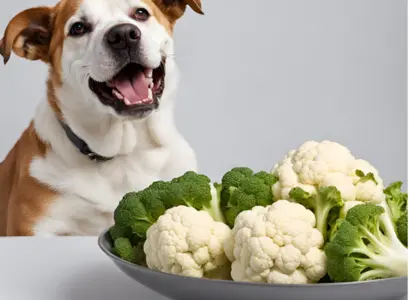
Precautions when feeding cauliflower to dogs
When feeding cauliflower to dogs, it is important to take certain precautions:
- Introduce cauliflower gradually to your dog’s diet to monitor their reaction and prevent digestive upsets.
- Always wash cauliflower thoroughly to remove any dirt or pesticides before serving it to your dog.
- Cut cauliflower into small, bite-sized pieces to prevent choking and make it easier for your dog to chew and digest.
- Serve cauliflower to dogs in a plain and unseasoned form. Avoid adding salt, onion powder, or other seasonings, as these can be harmful to dogs.
- Monitor your dog closely for any signs of allergies or adverse reactions after consuming cauliflower.
- Consult with your veterinarian to determine the appropriate amount of cauliflower for your specific dog, taking into consideration their size, health condition, and dietary needs.
How much cauliflower can a dog eat?
Dogs can eat cauliflower in small amounts, and the quantity can be gradually increased based on their tolerance.
As a general guideline, cauliflower should make up no more than 10% of a dog’s daily caloric intake.
It’s crucial to start with small servings, like a bite or two at a time, and then gradually increase the amount once the dog has adjusted to it.
If they tolerate it well, you can gradually increase the portion size in moderation.
Can dogs eat raw cauliflower?
Yes, dogs can eat raw cauliflower. Raw cauliflower is safe for dogs to consume, but it should be washed thoroughly to remove any dirt or pesticides.
The cauliflower should then be cut into small, bite-sized pieces to prevent choking. Feeding raw cauliflower to dogs can provide them with additional hydration and essential nutrients.
Can dogs eat cooked cauliflower?
Yes, dogs can eat cooked cauliflower but avoid adding any seasonings, such as salt or garlic, as these can be harmful to dogs.
Steaming or boiling cauliflower until it is soft is the best way to prepare it for dogs. Let the cauliflower cool down before serving it to your dog.
Can dogs eat cauliflower leaves and stems?
Yes, dogs can eat cauliflower leaves and stems but ensure that they are thoroughly washed and free from any pesticides or harmful substances before feeding them to your dog.
The leaves and stems of cauliflower contain similar nutrients to the florets and can be safely consumed by dogs.
Can dogs eat cauliflower crust?
While cauliflower crust is not toxic to dogs, it is crucial to check the ingredients used in the crust. Some cauliflower crusts may contain harmful seasonings, such as garlic or onion powder, which can be toxic to dogs.
If the crust is made from cauliflower alone, without any added ingredients that are toxic to dogs, it can be given to dogs in moderation.
Cauliflower crust has gained popularity as a gluten-free and low-carb alternative to traditional pizza crust.
Can dogs eat cauliflower rice?
Yes, dogs can eat cauliflower rice, however, it is important to serve cauliflower rice plain, without any added seasonings or oils that may be harmful to dogs.
Cauliflower rice is a low-calorie and grain-free alternative to traditional rice. It can be a healthy addition to a dog’s diet, especially for those with dietary restrictions or weight management needs.
Can dogs eat broccoli and cauliflower?
Yes, dogs can eat broccoli and cauliflower. Both vegetables are safe for dogs to consume in moderation and are both rich in are rich in fiber, vitamins, and minerals.
Broccoli and cauliflower are part of the cruciferous vegetable family and offer similar health benefits.
However, some dogs may have difficulty digesting these vegetables, leading to gastrointestinal upset. It is important to introduce broccoli and cauliflower slowly and monitor your dog’s reaction.
Other foods and fruits safe for dogs to eat
In addition to cauliflower, there are several other foods and fruits that are safe for dogs to eat in moderation.
Here are some examples:
1. Broccoli
Like cauliflower, broccoli is a safe and nutritious vegetable for dogs. It offers similar health benefits and can be included in a balanced diet.
2. Peas
Peas are a good source of vitamins and minerals for dogs. They can be served cooked or frozen as a healthy snack or addition to meals.
3. Raw Chicken
Raw chicken should be handled with caution, but small amounts of raw, boneless, and skinless chicken can be given to dogs. It is important to ensure the chicken is fresh and from a reliable source.
4. Cantaloupe
Cantaloupe is a refreshing and hydrating fruit for dogs. It is low in calories and high in vitamins A and C, making it a healthy treat.
5. Pineapple
Pineapple is a sweet and tangy fruit that dogs can enjoy. It is a good source of vitamins, minerals, and antioxidants.
6. Rice
Plain, cooked rice can be a safe and easily digestible option for dogs, especially those with upset stomachs or diarrhea. It can also be mixed with other ingredients to create a balanced meal.
7. Celery
Celery is a low-calorie vegetable that can serve as a healthy snack for dogs. It is rich in vitamins A, C, and K, as well as fiber.
8. Bananas
Bananas are a great source of potassium, vitamin C, and fiber. They can be given as a treat or mashed and mixed with other ingredients.
9. Shrimp
Shrimp can be a tasty and protein-rich addition to a dog’s diet. However, it should be cooked thoroughly and served in moderation to avoid any potential digestive upset.
Conclusion
The question “Can dogs eat cauliflower?” is frequently asked by pet owners, and the answer is yes, they can. Cauliflower can be a healthy addition to a dog’s diet when offered in moderation.
When prepared and served appropriately, cauliflower can provide various essential nutrients and potential health benefits for dogs.
While cauliflower is good for dogs, it should only constitute a small portion of their overall diet, with the majority of their nutrition coming from a balanced dog food diet.
It is also important to consider the health benefits and risks associated with cauliflower for dogs mentioned in this article and exercise the necessary precautions.
Additionally, consulting with the best veterinarian in your area before introducing cauliflower or any new food into a dog’s diet is recommended to ensure it aligns with their specific dietary needs and to prevent any potential adverse effects.
Top searched articles:
- Can dogs have olive oil?
- Can dogs eat corn?
- Can dogs eat tuna?
- Is salmon oil good for dogs?
- Best 10 probiotics for dogs
- Pancreatitis in dogs
- 10 benefits of therapy dogs
- 40 Mediterranean diet breakfast ideas
- 1600-calorie meal plan high protein
- Is avocado safe for dogs?
Frequently Asked Questions (FAQs)
Is cauliflower bad for dogs?
Cauliflower is not inherently bad for dogs. However, it can pose risks if given in excessive amounts or if the dog has certain health conditions. It is important to introduce cauliflower gradually and monitor your dog’s reaction.
Can dogs eat cauliflower cooked?
Yes, dogs can eat cooked cauliflower. Cooked cauliflower is easier for dogs to digest compared to raw cauliflower.
Can dogs eat cauliflower leaves?
Yes, dogs can eat cauliflower leaves. The leaves of cauliflower are safe for dogs to consume and contain similar nutrients to the florets.
Is cauliflower safe for dogs?
Cauliflower can be safe for dogs when given in moderation. It is important to monitor your dog’s reaction and consult with your veterinarian before incorporating cauliflower into their diet.
How much cauliflower can I feed my dog?
It’s important to only let 10% of your dog’s diet come from treats, including healthy goodies like cauliflower.
The other 90% should come from a well-balanced dog food diet. General portion guidelines are provided based on the dog’s weight to avoid potential choking hazards or intestinal blockages
